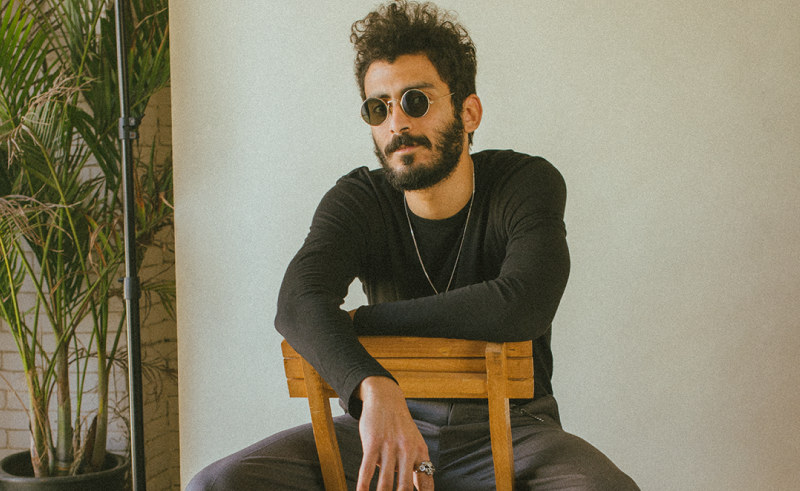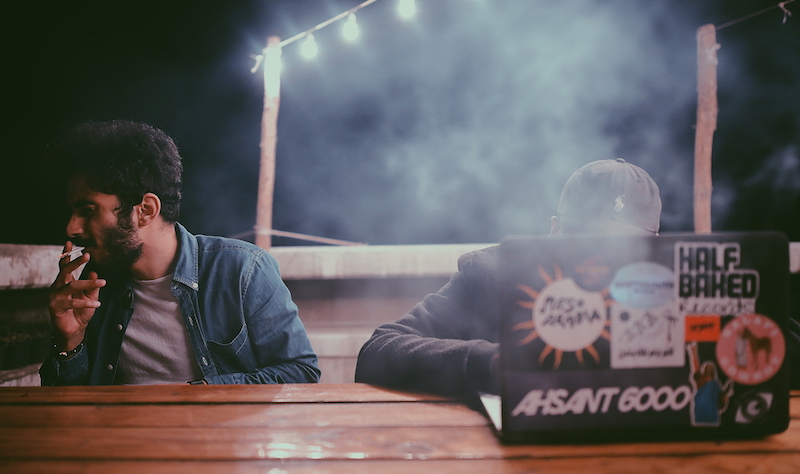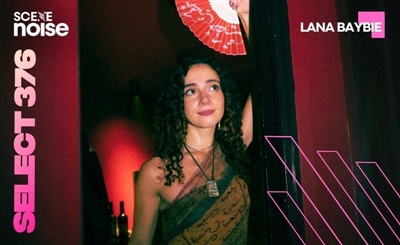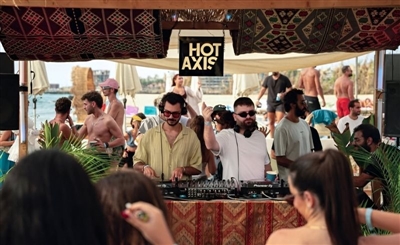Psycho’s Semantics: Moe Hani on Being a One-Man Band, Pushing Progressive Pop & Egypt’s Rock Scene
SceneNoise's Yaseen El Azzouni speaks to Moe 'Psycho' Hani about flying solo as Dirty Backseat, his evolving role in music as co-founder of Cairo imprint, SOLVVDK, and more.

I first met Dirty Backseat a little over a year ago at the old HIZZ house in Garden City. Still a duo at that point, they pulled up dressed from head to toe like true rock stars — ripped jeans and all — in a way that seemed organic, rather than forced and cliché. They had the sound to back it up, too. Synth-pop fused with a tinge of no-wave melancholy, and the occasional punk riff scattered amongst massive, reverb-soaked soundscapes.
Now a solo act, Moe Hani has been putting
out a steady stream of EPs that puts even the most diligent release schedule to
shame. As part of the team running SLOVVDK, a Cairo-based imprint focused on
making ‘forward-thinking pop music’, Moe has been an integral part of their
regular label showcase at Cairo Jazz Club, as well as one of the main forces
pushing indie music throughout Cairo. Through SLOVVDK, Moe has helped debut
acts such as Felukah, Mineral Kult, and Zeyada to Cairene audiences.
Egypt’s once active rock scene has been all but erased as electronic music has gone mainstream, and begun slowly infiltrating the bars and venues previously home to bands. Instrumental musicians are faced with the choice of either relegating themselves to roles in cover bands, or shifting careers towards electronic production and DJing. Amidst this shifting landscape, Moe is one of a handful of artists fusing the two genres, with one hand on a guitar and the other on a midi-keyboard.
Yaseen: Take me through a short history of
Moe Hani in music.
Moe: I’ve been in a lot of silly bands over the years, [back when] I was just trying things out. In my school days I started as a bassist by learning on a Spanish guitar. In 2006 a friend of mine was a bassist in an Iron Maiden tribute band. He was the cool kid around school. My school had a shitty music program, and I wanted to play that kind of music, so I stole a Spanish guitar from school, and cut the last two strings so it would be [like] a bass. My friend would come by every now and then and teach me things. I had this other friend who had started to learn guitar properly and he used to listen to System of a Down, Metallica, Iron Maiden, those sorts of groups. We started jamming, but I didn’t know [anything about guitar]. After a bit I picked up a few songs, one at a time.
Later on, I started to
realise, “dude, you come from a musical family” — my mom is a pianist and lead
singer already. She sings oldies and stuff like that, and used to join this band
at the Shooting Club in Dokki, Cairo. Mostly Arabic music, oldies and
covers.
I started to feel like there
was something that I can relate to my mom: music. So, I joined a few bands. The
first time I stepped into a studio I sat down at the drums, because I wanted to
play the drums alongside the bass. I only knew how to make a 4/4/ beat with the
kick drum, hi-hats and snare.
After that I met George
Aboutar at a party. He was in a Guns n’ Roses tribute band. This was very cool
back then and they used to play covers of the Dire Straits, AC/DC, a lot of
classic rock stuff. George was the lead singer and he didn’t play the guitar at
all. I met him and told him, “we should do something together.”
.jpg)
By the time we went down
to the studio and jammed I had introduced him to a friend of mine — my best
friend now — a guitar player who was with us in our band, The Jokers. A year passed and we
had become this proper group and we started writing a lot of music. After that,
we went through the whole process of being band mates; we did everything
together, went drinking together and all that, you know?
This was around the time
of VENT. This one time I went to see a band called Living Too Late, and when I
saw them for the first time I was like “wow! There are bands in Egypt that
actually sound nice.” After that I saw PanSTARRS and was like, “there are bands
like us!”
By that time, I had
already left The Jokers and I joined Hani Mustafa in Egoz, and a couple
other projects. I think in 2013 there was something happening, something moving
[in Cairo’s] community, the underground/indie scene. Wetrobots, PanSTARRS,
Ismail Hosny, ZULI, Asem Tag — there was stuff happening for real. It was
really great, and I wanted to join [that scene] at the time, but I was in a
really different place.
That’s all regarding bands; I stayed in bands for a really long time. Dirty Backseat was me wanting to do things in my own way. I used to feel like I was the second guy in any band I joined. Like, I’d have these ideas and songs, but I couldn’t integrate them with the band well. It was time to do my own thing and explore a bit. I had my ex-wife with me at the time [and] she used to help me out as well. Now, I’ve started to feel like I’m ok with playing solo, I like a certain style and I want to continue in it and develop it a bit more.
<iframe src="https://www.facebook.com/plugins/video.php?href=https%3A%2F%2Fwww.facebook.com%2FSceneNoise%2Fvideos%2F1656446151102980%2F&show_text=0&width=560" width="80560" height="450" style="border:none;overflow:hidden" scrolling="no" frameborder="0" allowTransparency="true" allowFullScreen="true"></iframe>
Y: It sounds like you’re making music on
your own terms now, rather than having to deal with dynamics between band
members.
M: Yeah, pretty much. I
believe that — in every band — there’s always a songwriter [in charge]. In the
Beach Boys, for example, Brian Wilson was the one who had the vision for the
tracks, albums and all the projects that would come out from the Beach Boys. He
was the mastermind behind it. I admire him for this; someone with ideas who’s
able to bring them out. He wasn’t using [his band mates] of course, everyone
gives his or her contribution in one way or another, but there always has to be
someone who has the vision.
Y: Like the director of a movie.
M: Like a filmmaker,
exactly. If everyone plays that role, it doesn’t work. There’s always a
filmmaker, a producer, an assistant producer. There’s a hierarchy, you have to
know where you stand. With myself I feel like I’m more of a musician than a
producer. I’m trying to develop as a producer all the time, so that I can reach
the higher and higher places I want to reach.
Y: It’s a constant process.
M: Yeah, it’s a process,
but I enjoy it, you know?
Y: Since you mentioned Iron Maiden and
Metallica earlier, any idea what’s happened to the Egyptian death metal scene?
M: Fuck, man. I didn’t
even notice that [it had disappeared]. I once volunteered at a metal festival
in Egypt. I don’t remember when it was, it was a while ago. I had a couple of
friends who used to organise Metal Blast Festival at El Sawy Culture Wheel.
They were asking for volunteers, so as a friend I volunteered. I wanted to see
the process, you know, death metal bands coming in from abroad – bands from
Sweden, Norway, and the United States.
Y: The Swedes!
M: The Swedes and
Norwegians man! Longhaired, long-bearded guys you don’t want to fuck with
(laughs). I don’t know what happened to the scene though, all of a sudden Metal
Blast stopped, and you stopped hearing about things. I never really followed
that scene honestly; I never understood it and I never really liked it. My
friend who was organising it said that there were a lot of issues between
people within the metal scene; no one wanted to volunteer or help each other.
This is a major problem
that we have here in Egypt, in general, with each other. Even as producers, or
artists, or musicians, those who help each other or collaborate are very few.
This was the idea with SLOVVDK, you know? We wanted to build a community
together, like VENT did and succeeded back then. They built a community and the
likeminded people all connected. We didn’t know how to do it the way VENT did,
with a club and parties, but we’re doing a more of an online-based imprint. [We
thought], lets gather up graphic designers, artists, and producers, musicians —
whatever — to work together. To collaborate.
Y: Volunteering, without the expectation
of getting paid, is really important in building a community.
M: Exactly! When you
look back at history, with every wave of music there was always a community
supporting each other, partying together, working together and collaborating
with each other. If someone knew a promoter or club owner, they’d connect them
with [the right] people and then these things move forward. But if we’re going
to fight with envy, jealousy, [with] everyone closed-up and not wanting to collaborate
or contribute anything, it’s not going to work out, you know? It’s not going to
work out for anyone. All the people around me realise that this attitude is just
useless.
Y: Having access to physical spaces is
also really important for this to happen.
M: One of the best
things I’ve seen — regarding community — is at Cairo Jazz Club. Ever since
someone from the community, Omar Foda of Living Too Late, joined
[Cairo Jazz Club] it’s been a lot better. Before Foda joined Cairo Jazz Club, Alt
Tuesdays and that sort of thing didn’t used to exist. It would just be a
couple of well-known names [and] it wasn’t as versatile as it is now. It was
mostly cover bands, DJs and all that. Before Foda there was Mai Waleed, Youssef
Abouzeid and some others from the community who were totally supporting. I
[just] mention Omar a lot because he came up with new ways to develop [Cairo
Jazz Club], like with this Wall of Sound series of gigs. He’s bringing
in bands from abroad, some really heavy players.
Y: When I saw the announcement for
Homeshake, I thought: “they’re not even playing in the U.S. and they’re playing
a gig at Cairo Jazz Club?”
M: He sort of developed
the idea of the indie musician [in Egypt], the indie artist and indie art in
general. This happened because there was someone from the community working at
CJC as a promoter, and he’s got the attitude to boost things, to encourage
[the] local indie artists that we have here to perform more, which is an edge
to be honest.
<iframe width="800" height="450" src="https://www.youtube.com/embed/tcbiNyqQY_0" frameborder="0" allow="accelerometer; autoplay; encrypted-media; gyroscope; picture-in-picture" allowfullscreen></iframe>
Y: The ‘band scene’ in Egypt has shifted a bit recently, hasn’t it?
M: It’s shifted a lot.
Like I was telling you, a while ago — which I was playing in bands — there
[used to be] a lot of rock bands. It was a sort of trend, there was always a
live band playing rock. There was a cover ‘format’ or an ‘original’ format, and
promoters used to ask you, “are you a cover band or original band?”
The original music
always used to bring a smaller crowd. There were some bands that started
singing in Arabic. There were big names, of course, they’re now making music
for advertisements and making money. It’s evolved [since then], but that’s all
we could’ve done with the rock scene. The rock scene is dead now, for a number
of reasons. Rock musicians didn’t reach success in the short time that rock
music was popular. If you’re in a cover band today, you either get your money
and accept it, or you shift career completely; shift [your] style and go to
electronic music, learn production or how to DJ for the dance floor.
Y: The rock scene definitely peaked.
You’ve got bands now doing songs for soft-drink companies and stuff like that
for ridiculous amounts of money. I heard that one of the top bands did a gig at
some hotel, and got paid easily over EGP 100,000 for a standard set length.
There’s so much money involved, every song they make is guaranteed to go viral,
and that’s as big as a band is ever going to get in Egypt.
M: In the end, this is
how it goes. They’ve managed to make a living; they’ve managed to make
something catchy [enough] to reach the ordinary people living in Egypt. You
have to be smart about it, write things that are catchy [enough] that they’d
understand. It also has to have that heshek beshek sound, and then
you’ve got a hit! There used to be a friend of mine who played in an Arabic
singing band who’d always tell me and George: “you guys need to write the same
music, just sing them in Arabic. Try to translate the music.”
We weren’t convinced at
all. I don’t want to do that. I still believe that there are people in the
world that listen to music that’s different. In Egypt there’s a social
category, or social class, that listens to what we’re doing. It’s just the fact
that we don’t know how to reach them properly; but I’m not going to change what
I do best in order to reach more people. It won’t make a difference to me what
social class someone is from, what matters is that the music just has to reach
the proper listeners. I think this is how the rock scene faded; nobody is
interested in rock music anymore.
People now, and over the
past few years, are looking for more ‘to the point’ music. People want to go
out, have drinks, hang out with friends and have a nice party. That’s it.
Y: Would you say the performer themselves
is less of a focus? That the crowd is going out to have a nice night, not
necessarily listen to music that deeply?
M: Yeah. Unless they’re
like FKJ, or something.
Y: It’s obviously a huge privilege to be
able to travel, but looking at the big clubbing cities of the world (New York,
London, Berlin), going out to listen to music/dance isn’t a khorooga. It’s
happening so often that it’s become a normal outing, like going to a park. It’s
a public service. I don’t know how many times I’ve gone out in Egypt and seen
people dressed nicely. It makes me think: “why, what’s the point? You’re all
going to be sweaty at the end of the night anyway.”
I feel like it’s because people aren’t
entirely comfortable in these kinds of social settings yet. The constant
photography at gigs makes you feel like you’re always being seen. It makes you
want to dress nicely, to act nicely and show everybody around you how much of a
good time you’re having. It seems a bit unnecessary.
M: It’s a psychological
thing, and it’s a pity. Like if I’m looking at CairoZoom or something on
Facebook, looking for an album that I might be in, I find hilarious comments
like: “look at these kids who go to be photographed by CairoZoom,” they dress
up really well and go pose for those photos. They have a reputation.
Y: looking at the comments there’s some
really savage ones.
M: It’s like internet
bullying, really shitty [behaviour].
Y: I feel like there’s a genuine desire
amongst people in Egypt to be more comfortable going out, you know? To not make
it such a high-pressure thing. We’ve all seen too many pointless fights at
clubs, too much unnecessary machismo.
M: It should be simple.
Just the fun of enjoying good music, a couple drinks, dancing if the vibes are
good. You don’t need any of that other stuff. To be honest, regarding music
scenes, I think the DJ scene in Cairo is booming. That’s where the real party
scene is.
Y: Prior to the COVID-19 shutdown you played
a show, part of a SLOVVDK showcase, where you brought on a couple friends and
collaborators during your performance. Since historically Dirty Backseat has
gone from a duo, to a solo act, are there any plans to open up Dirty Backseat
into a larger collaborative project?
M: I’ve had an idea for
an album with multiple collaborators on it. I’m in contact with a number of
people, mainly old friends. There are a couple songs featuring Omar Foda,
Hashem El Saify, George Aboutar and Mariam Ghareeb. There are also two tracks on
the album with Yosr from SLOVVDK. There are a couple of solo tracks, but they
all fit together perfectly. The album is very chill, I’m using guitars more
than synthesisers. It’s more of a mixtape in an album format. I decided to try
it out during the SLOVVDK showcase, to play the tracks live and see how people
would react.
Y: We’ve talked about some of your
influences in the past: The Strokes, Caribou, Tame Impala and Ariel Pink. Most
of these artists fall more towards instrumentation than the electronic side of
music. Are there any electronic acts that currently inspire you?
M: Darkwave and
synth-pop stuff. Boy Harsher, for example, and Marie Davidson. There’s this
French duo from the eighties called Deux. Oppenheimer Analysis. Musicians that
are mainly dark-wave, synth-wave and synth-bass mostly. The Hacker. There are a
few more electronic people that I listen to, [but] I don’t usually listen to
dance music, or even IDM and that side of electronic music. Jamie xx is one of my
favourites though, there’s a lot.
Y: At what point did you first decide to
start putting together the ideas for SLOVVDK with Blufrank?
M: Since January 2019, but
we’d been working together already by then. I had this EP that got released in
2019, we talked [about it] online and he said he really loved the song. He kept
asking, “How did you record it? How did you make this sound and that
sound?”
I liked that he talked
specifics. At the time, I was following the demos he was releasing on SoundCloud
and told him “I think you’re really legit, lets collaborate sometime.”
When you really get to
know Ragy (Blufrank), you realise that he’s the type to sit alone in his room
making music all the time. He told me that he’d gotten tired of playing in
bands where everyone wanted to go in their own directions, he said: “I want to
write my own tracks my own way, fuck that shit.”
We’ve been hanging out for a really long time, working on things together. Recently we started making music together, we did a couple tracks. Since we started working together two years ago, we haven’t had the time to work on music together [until now]. We’ve got three songs done.

Y: Blufrank reaches out to everyone. He’s really open to new music and there are not many people like him.
M: He influenced me a lot in that sense; gathering people and making more connections, in the sense of creating something that could sound even better when you collaborate than when on your own. It pushed me, honestly. To push barriers, to reach to someone from a different background that me to write a song together. I did this with an old friend of mine (Marian Ghareeb) at the last SLOVVDK showcase. She had called me a year ago to make a track together. She’s in a totally different musical style than mine and it turned out great. I really liked the track, it’s on the new SLOVVDK mixtape. That was her first properly recorded song, she’d never written a song before that.
That collaboration
really made me feel like a producer. When I was younger, I thought a producer
was anyone who sits in a studio and manages the instruments, manages the whole
process; the person who is in charge of how the song would sound like. Yes,
this is a main part of being a producer, but there’s another part that I feel
is more important. That’s for you to create something really nice, or sounds
completely different to what’s happening, turning something that’s very basic
into something with a lot of instruments and a lot of progression. It changes
the whole thing into a good song, into a hit. I’m learning a lot along the way.
<iframe style="border: 0; width: 700px; height: 472px;" src="https://bandcamp.com/EmbeddedPlayer/album=382762562/size=large/bgcol=ffffff/linkcol=0687f5/artwork=small/transparent=true/" seamless><a href="http://slovvdk.bandcamp.com/album/slovvdk-mixtape-ii">SLOVVDK Mixtape II by SLOVVDK</a></iframe>
Y: Do you find yourself playing different roles in the studio depending on whom you’re with?
M: It doesn’t change
that much, honestly. I usually perform the way I usually do; the same workflow,
the same process. I just try to come up with creative ideas out of the box.
There’s this track that got sent to me with just guitar and vocals. The writer
wanted to have drums, to have a proper song. Normally I lay things down like,
“ok, I have this song, let’s just jam on it with different sounds.”
Sometimes it shifts from
my style depending on the song’s style, [and] this is when things change a
little bit. But I always use my own sounds, my own touch on the music. It gives
it a sense of collaboration in the end; this is the producers touch on the
songwriter’s song. The process or workflow doesn’t change, but what’s different
is the style of the songwriter and the direction the song wants to go in.
Y: What about collaborating live?
M: It’s a lot more
intimate. If you’re a solo artist, it’s very intimate. The SLOVVDK showcase
went really smoothly. I featured a couple old friends who I mentioned before,
and [the show] sounded good. It was a lot of fun. I miss having someone on
stage with me. [Coming from a band background] I’m used to having people, you
know? The first solo gig I did, I was a bit frightened. I had a sort of stage
fright. Blufrank was really shocked, he was on the same line-up and told me:
“why are you stressed out? You’ve been performing live for ten years!” I’d never performed solo
until then, it felt so stressful.
Y: Being onstage alone, especially after
being in bands, must have been difficult at first. There’s no one with you to
carry the energy with you throughout a show.
M: It’s also tricky.
Usually I feed off my band mates’ energy. At the same time, if the crowd is not
giving you energy you’re still [getting] it from your band mates. When I
perform solo, especially when I’m performing with this current setup (laptop,
midi controller, backing tracks) it sounds like rock, but it’s done
electronically.
Y: How do you feel like the crowds in
Egypt react to seeing rock acts in what are usually electronic music spaces?
M: The very first time I
performed [as Dirty Backset] our drummer quit for some reason, and it was just
me and another former member. I played drums as a backing track while we played
guitar and bass. It sounded a bit weird, for a rock band. The only element
missing were real drums, [instead] they were played with a drum machine. It
felt weird, to the audience, especially since we were playing on the same line-up
as two other rock bands. Over time, when I started playing solo, people got
used to it. I believe it’s mainly psychological, what people get used to listening
to. Imagine Kevin Parker [from Tame Impala] playing solo or with his band, all
his instruments would sound the same. The music coming out of the speakers
would still be fucking good, it would be the same, but it would be weird
visually. Now when I play, people know that I’m playing solo and give me the
energy I need. They got used to Dirty Bbackseat as a solo project.
Y: You’ve been keeping busy in between
shows by releasing a lot of music – a quite a high output compared to a lot of
other people in the scene. How do you know when a song is done?
M: I don’t know. I don’t
think about making a very complicated piece of music. I just always think of
making music as simple as fuck. Basically, all my songs have a
verse/chorus kind-of format; the basic pop format. I’m not trying to make it
more than it is. If it sounds nice it sounds nice, it’s okay. Ever since I
started working with Ragy, he always tells me: “if it sounds nice just proceed,
don’t overcomplicate things.”
Neither of us likes
overcomplicating the music, unless it needs it. I know it’s finished and I know
it’s done when its sounds good, and I feel like the verse/chorus is fine. If
there’s a catchy melody, there’s a nice intro and outdo, and a nice feel in
general, it doesn’t matter how long or short it is. I never cared for that to
be honest.
Y: You’ve put out like five projects over
such a short amount of time. One which I’m really interested in talking about is
the Apocalypse soundtrack, which you released under your own name rather
than Dirty Backseat.
M: It was a very
interesting process and it was very challenging as well. There’s a filmmaker friend
of mine who was directing this indie film called Apocalypse alongside
another filmmaker. Ramy – the filmmaker and a friend of mine – had an idea for
the music and wanted me to score the film. I told him I had never done that before,
that it was going to be very challenging and would need some time. To be honest
with you, I was too overwhelmed with the process. I wasn’t acting myself at the
time, which was more than a year ago when it started. It was overwhelming and
challenging. He came up with the idea that he wanted to mix spaghetti western
influences and bass-y, synth-y sound. Heavy industrial bass sounds. I went back
and forth a lot, I spent two/three months writing, and in the end those three
tracks were released. When they were released, I felt really honoured when the
film got played in the cinema, and I got to hear my music in a movie theatre.
It was the coolest thing I’ve ever witnessed in my whole life, honestly.
Imagine you’re sitting in a cinema watching a movie and you realise, “I’m
listening to my music in a fucking movie theatre!”
Regardless of whether
it’s a big movie or a small movie, it didn’t matter to me; I was listening to
my music in a movie theatre. You [get to] hear all your mixing and mastering.
Y: And everyone there has to listen to it
intently. You know they’re going to hear it properly because they’re so focused
on the film.
M: Yeah. Before the
screening, I was at home listening to the EP and soundtrack of the film. I’d
turn the volume all the way up, to hear that the bass and everything sounded
good. I had already submitted the music, but I was just reassuring myself that
things would be fine (laughs).
Y: It sounds like you enjoyed the
experience. Is soundtrack work something you’d like to do more in the future?
M: I would love to do it
again and I’d also like to study it. Film scoring is very different than what
we do as music producers. There’s a lot of depth to it. What I did was really
fitting for the film, because I sat and studied the film for a very long time;
to know where to put the tracks, shift the transitions between scenes. Film
scoring is on a much higher, more substantial level; you need to do a lot more
studying. There are a couple tricks you play with to make it sound good. If I
was going to go in the direction of film scoring, I have to learn a lot in
order to do it. Right now, I’m focusing on what I do best; producing songs and
writing songs, that’s it.
Follow Moe Hani as Dirty Backseat on Instagram, Facebook and YouTube.
*Some passages of this interview were translated from Arabic to English
- Previous Article test list 1 noise 2024-03-13
- Next Article Seductive New R&B Track from Shébani and RoseGld Talks Love in the Time of Corona
Trending This Month
-
Jan 29, 2026






















